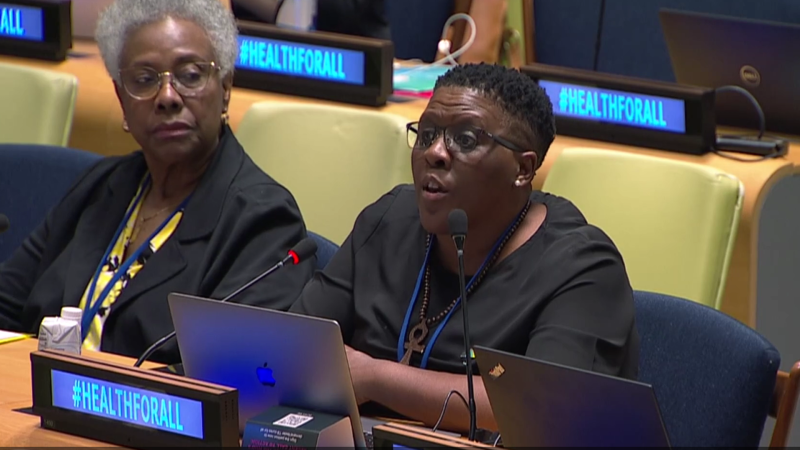Where We Work
See our interactive map


Babalwa Mbono, Strategic Project Officer for mothers2mothers and former Mentor Mother, delivers an intervention at the United Nations Multi-Stakeholder Hearing on Universal Health Coverage in New York, May 2023.
Let’s give them platforms to share their recommendations and pay them fairly.
The global health community is in Geneva this week for the 76th World Health Assembly (WHA). With this year’s theme “Saving lives, driving health for all,” it is critical for the conversations to be laser-focused on turning words into action to deliver for the more than half a billion people across the African continent who still do not have access to basic health care.
For us at mothers2mothers, an African Primary Health Care NGO and member of the Frontline Health Worker Coalition, this focus should especially hone in on the vital and life-saving role that female community health workers (CHWs) are playing in unlocking health for all for their peers.
More needs to be done to ensure local female CHW voices are represented in global fora.
I was in New York earlier this month for the Multi-Stakeholder Hearings on Tuberculosis, Pandemic Preparedness and Response, and Universal Health Coverage (UHC), where I delivered an intervention from the floor and highlighted the contribution of CHWs. But it struck me how much more needs to be done to ensure that local female CHW voices are represented in global fora to truly improve the working conditions and guarantee the fair recognition and remuneration they deserve. Too few of the conversations still do not include the voices and point of views from the people who experience the reality of working on the frontlines, and that needs to change.
Why? Because no genuine talk of achieving UHC by 2030 would be complete without thoughtfully considering and integrating CHW solutions and responses. UHC depends on quality primary health coverage (PHC), which in turn relies on paid, professional, skilled, and supported CHWs—in other words: CHWs + PHC = UHC. And we know that scaling up primary health care interventions across low- and middle-income countries could deliver the kind of gains that will firmly set the world on the path to achieving health for all by 2030—from saving 60 million lives to increasing life expectancy by 3.7 years.
With CHWs’ proven ability to save lives and improve health, we must unlock the full potential of this remarkable group to deliver health for all.
12,000 Mentor Mothers reached over 15 million people across Africa with life-saving services.
For m2m, this potential lies in particular with female CHWs. As a former m2m CHW myself in South Africa, and now a passionate advocate for the recognition of and investment in this critical element of the health system, I have experienced first-hand what can be achieved when we invest in female grassroots leadership. m2m’s model of training and employing local women living with HIV as CHWs—known as Mentor Mothers—across ten African countries has created a ripple effect of health and hope for the communities we work with, as well as the women we employ. Since our creation in 2001, nearly 12,000 Mentor Mothers have reached over 15 million people across a dozen African nations with life-saving health services, including maternal and child health, reproductive health, and HIV services; and helped to keep more than two million women and children alive, who would otherwise have been at risk of maternal and child mortality.
Female CHWs like m2m Mentor Mothers have a unique ability to build relationships with their clients, especially women, children, and adolescent girls, and understand what they are going through thanks to their lived experiences. We have also found that engaging men in their homes is often more effective than other spaces. Owing to the insights and skills that training alone cannot provide, and their tireless work in facilities and door-to-door in their communities, Mentor Mothers are ensuring that their peers access, and crucially, stay in care. In 2021, 100% of our clients who tested positive for HIV accessed antiretroviral therapy, compared to an 85% benchmark for Eastern and Southern Africa.
The time to invest in female CHWs is now. Not “tomorrow.”
This is what has made m2m’s impact so meaningful and long-lasting—our investment in, and employment of, African women living with HIV as CHWs.
Yet only 14% of CHWs in sub-Saharan Africa are salaried, and the health sector faces a 24% gender pay gap, despite women making up almost 70% of the total workforce. This is simply unacceptable.
The time to invest in female CHWs is now. Not “tomorrow” or “soon.” Now.
What should this investment be directed towards? Equal and fair pay, and formal recognition of the status and qualifications of female CHWs through certification and accreditation. Those are all things that motivate CHWs to work harder, build the confidence of their community in them as professionals, and show that their work is valued. This is how we help set CHWs up for success and unlock their potential to help us reach the Global Goal of Health for All. I know that this is true because this is what my own employment and remuneration as a CHW meant to me.
The under-representation of women’s voices and needs in the health care sector, and under-recognition of female CHWs is still too rife and needs to change. That is why our work with the Frontline Health Workers Coalition to ensure fair remuneration and full recognition and accreditation of female CHWs in national and global policy frameworks remains so timely and vital—and why, this week, we will be urging United Nations Member States at the WHA to embrace our ask for fairer pay and better recognition for female CHWs, and to create more opportunities to hear from more CHWs at upcoming global gatherings.
This post was originally published on the Frontline Health Workers Coalition Blog. IntraHealth International leads the secretariat for the coalition.
Get the latest updates from the blog and eNews




